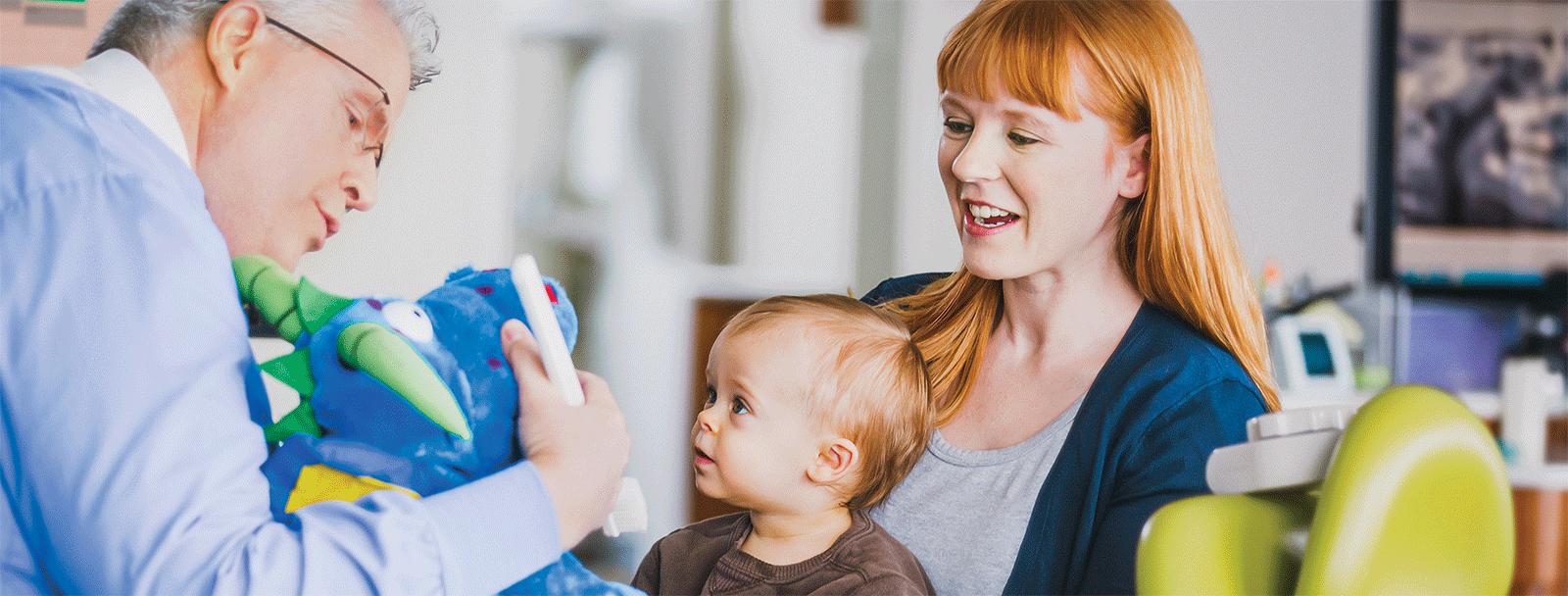Your privacy is important to us. Consistent with our Website Privacy Policy, we may use cookies and other tracking technologies to ensure the performance and security of our website. This may include disclosures about your use of the website to third parties. By using our website, you agree to its use of these technologies.


Life Stages of Oral Health: Baby Basics ages 0-3
Meet Josh and Bridget’s new bundle of joy, Owen. As first-time parents, they have their hands full figuring out mess-free diaper changes, lightning-fast bottle making, and that magic rocking rhythm guaranteed to calm a fussy baby. They’re also discovering the basics for infant oral care. Even though he lacks teeth, Owen's oral health still requires attention.
When do you start cleaning baby teeth?
Even though a baby's first tooth won’t show up until sometime around 6 months of age, gums still need to be wiped with a soft, clean cloth after each feeding to get rid of unwanted bacteria. Once the first tooth comes in, use a small, soft-bristled toothbrush with a smear of fluoride toothpaste to keep Owen’s teeth and gums healthy. When his two teeth touch, and his parents can’t clean between them with the brush, it’s time to start flossing.
Young children often swallow most of the toothpaste put on their brush, so use just a smear of fluoride toothpaste until 2 years of age. After children turn 2, use a pea-sized amount and continue to supervise or brush their teeth for them. Make sure they spit out the excess. When children get too much fluoride while their teeth are still developing, it can cause a condition called dental fluorosis, which can leave barely noticeable light white spots or streaks on the teeth.
How can I help my baby with teething pain?
Speaking of those first few teeth, your baby may experience some discomfort as they make their debut. That means parents may also experience some discomfort in the form of frustration and sleepless nights as they try to soothe their little one. They can try teething rings, a cool spoon, a pacifier or a cold, wet washcloth to help ease the pain. Massaging his gums using a clean finger may also help.
When do babies have their first dentist appointment?
Start visits at 12 months of age or six months after the first tooth appears. When Owen’s first tooth finally comes through, his mom knows she needs to make his first dental appointment. Bridget is ensuring that her son develops a good relationship with the dentist from a young age and establishes a dental home for any future emergencies or problems. During the first checkup, the dentist will make sure everything is developing properly and provide a few tips on caring for a young child’s teeth.
Bottles and Binkies
Luckily, Josh and Bridget already have a good start on little Owen’s healthy habits. In addition to establishing a daily gum and teeth cleaning routine from the start, they know some of the other key elements for good infant oral health.
- Even though they’re tempted to “clean” the pacifier off in their own mouths when it falls on the floor, they don’t. They know that oral bacteria can be passed from mouth to mouth. (That’s why they always carry a couple extra binkies.)
- Likewise, they know that they won’t be sharing utensils, straws or food when Owen is old enough to start eating solids.
- They don’t fill Owen’s bottle with milk or juice at naptime or bedtime because they know that prolonged exposure to the sugar in those drinks can cause tooth decay.
- They realize that pacifier use and thumb-sucking are harmless at this age, but plan on keeping an eye on those habits as Owen gets older. Chronic thumb-sucking or use of pacifiers after the age of 3 may cause baby teeth to move out of their proper position and permanent teeth to come in incorrectly.
Even though they’re still learning the ropes when it comes to babies and everything that goes with them, Josh and Bridget have gotten off to a great start with Owen’s oral health. Because healthy primary teeth set the stage for a healthy permanent set, how they take care of Owen’s teeth in the first few years can have an impact for the rest of his life.
Frequently asked questions
Even though a baby’s first tooth won’t show up until sometime around 6 months of age, gums still need to be wiped with a soft, clean cloth after each feeding to get rid of unwanted bacteria. Once the first tooth comes in, use a small, soft-bristled toothbrush with a smear of fluoride toothpaste.
Speaking of those first few teeth, your baby may experience some discomfort as they make their debut. That means parents may also experience some discomfort in the form of frustration and sleepless nights as they try to soothe their little one. They can try teething rings, a cool spoon, a pacifier or a cold, wet washcloth to help ease the pain. Massaging gums using a clean finger may also help.
Start visits at age 1 or six months after the first tooth appears.
Sealants have the most benefits when applied to newly erupted molars and can last up to 10 years.
Resources